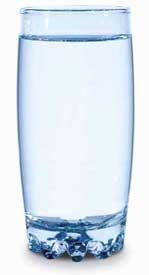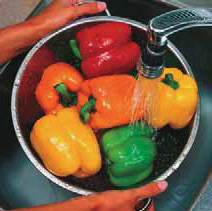Holiday season – View holiday hours for City of Winnipeg facilities and services from December 24 to January 1.
Winnipeg's drinking water quality
Frequently asked questions (FAQ)
Many people are able to taste or smell extremely low concentrations of chlorine in water and may be able to detect it in our water system. We have to maintain an adequate chlorine level at every customer tap to ensure the safety of the water and to meet regulations. If you live close to one of the places where we add chlorine, you will have more chlorine in your water than someone farther away.
An easy way to get rid of the taste and smell of chlorine is to fill a container of water and keep it in the fridge for drinking. Much of the chlorine will leave the water overnight. Cold water also tastes and smells better than water at room temperature. You will also save water since you don't have to run the tap until the water feels cold every time you want a drink.
Your discoloured water probably results from a change in the rate of flow of water in the system. This can cause sediment in the water pipes to loosen and be released into the water. The rate of flow may vary due to water main breaks, firefighting, water main cleaning, or increased water use during hot weather.
Discoloured water can come in a range of colours – from a light tea colour to a dark brown, cola-like appearance.
Read more at our discoloured water FAQ.
Visit our water main activity page to view all nearby repair work.
Water is cloudy when air gets in it and makes tiny bubbles. The bubbles are harmless and will disappear if you let the water sit in a glass for a few minutes. Cloudiness appears more often in the winter when the water is cold.
 Yes. We add fluoride according to the Provincial Fluoridation Program guidelines to reach an optimal concentration of 0.7 parts per million. Fluoride protects tooth enamel against the acids that cause tooth decay. We have added fluoride to our water since 1956.
Yes. We add fluoride according to the Provincial Fluoridation Program guidelines to reach an optimal concentration of 0.7 parts per million. Fluoride protects tooth enamel against the acids that cause tooth decay. We have added fluoride to our water since 1956.
According to Health Canada, the maximum acceptable concentration for fluoride in drinking water is 1.5 parts per million. Water containing fluoride at, or below, this maximum level does not pose a risk to human health.
Over 90 health-related organizations, such as Health Canada, Manitoba Health, the Canadian Dental Association, the Canadian Medical Association and the World Health Organization, recommend adding fluoride to drinking water.
Read more at our FAQs about Fluoride.
You should ask your doctor this question if you have an extremely weak immune system. The following people may have an extremely weak immune system:
- people with HIV/AIDS
- people with cancer
- people with genetically weakened immune systems
- transplant and other patients taking immunosuppressive drugs
 We recommend that you use only cold water for drinking and preparing foods. Hot tap water can contain higher levels of metals, such as copper, because metals in water pipes and plumbing fixtures dissolve more easily in hot water. If you need hot water for cooking and drinking, draw water from the cold tap and heat it.
We recommend that you use only cold water for drinking and preparing foods. Hot tap water can contain higher levels of metals, such as copper, because metals in water pipes and plumbing fixtures dissolve more easily in hot water. If you need hot water for cooking and drinking, draw water from the cold tap and heat it.
Bottled water is regulated differently from municipal drinking water. It is regulated as a food by the Canadian Food Inspection Agency. If you have any questions about a specific bottled water product, call them at 204-
A four-litre jug of tap water costs less than a penny.
For information on water filters and other home water treatment devices, you can call the NSF International free hotline at 1-877-867-3435 or visit:
If you want to buy a water treatment device, Health Canada strongly recommends that you buy one certified by ANSI/NSF. Many of the water treatment devices that are on the market can help improve the taste, odour and appearance of the water. Some products will reduce or remove things like Cryptosporidium and trihalomethanes. All certified treatment devices have the ANSI/NSF marking on the product stating which standard it meets.
Follow the manufacturer's instructions for taking care of your water treatment device. Replace filters when recommended. A filter that is not working properly could produce unsafe water.
Visit Health Canada.
Contact us or review our water supply system annual report or our drinking water quality report archives.
We will inform Winnipeg residents immediately if there is ever a water quality problem that could affect public health.
